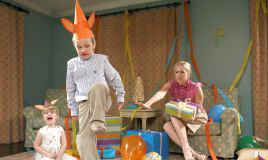|
|||||||
 |
|||||||
| Helping to make life 'calmer, easier and happier' for parents, teachers and children everywhere | |||||||
|
|||||
| WHETHER it’s your child’s play date persistently snatching the best toys, or a loudmouth kid on the bus shouting swear words, is it ever OK to discipline other people’s children? | |||||
 |
"It depends on what we mean by ‘discipline’," says Noel Janis-Norton, founder of the London-based Calmer, Easier, Happier Parenting Centre." Do we mean telling them off? Or do we mean teaching them? But I would take the opportunity to teach children — it’s part of what I believe an adult’s job is, and it can be done in a gentle, friendly way." |
||||
|
Janis-Norton, who wrote a book, Calmer Easier Happier Parenting, says several generations ago communities were more cohesive and children expected adults other than their parents to have something to say about what they did. "That’s part of what kept kids behaving well," she says. Niamh Hannan, psychologist with www.helpme2parent.ie, says "when did it stop being OK for parents to look out for other people’s kids? In modern society, we’ve become a little more insular. Working parents feel under pressure to be perfect. If our child’s disciplined by another, we take it as a personal affront," she says. "Yet, in reality, children misbehave and, when they do, there must be consequences so they learn to be responsible." Whether to discipline others’ kids or not is situation-dependent, Hannan says. "Stuff around safety’s non-negotiable. However, I might be a stickler about table manners with my own child, yet decide to let it slide with others." But you face a dilemma. Your child sees you letting behaviour go that you wouldn’t allow them to do. "It’s a conundrum," says Hannan. "You want to maintain something you’ve worked hard on with your own child, yet you don’t want to step on another parent’s toes. You could say something like, ‘oh my goodness, that was a big burp. What do you say? ‘Excuse me’. So your child sees you still have the same expectations of them." Hannan advises against singling out a visiting child for discipline but suggests a general rule — ‘in this house we don’t do that’ — and instructing the children towards the desired behaviour. Addressing misbehaviour — even that of other people’s children — can be constructive, if done correctly, says Hannan. "You’re letting them know that you are paying attention to them. By being an authority figure towards them, they feel they matter. If done in the right way, it can be constructive feedback from another authority figure who’s not their doting parents." When having children over to play, it’s important to prepare for success — prevent misbehaviour rather than deal with it. Prepare the environment –— for example, if you don’t want your goldfish or your cat falling foul of high-spirited young guests, remove the pets to a safe space. Janis-Norton recommends a ‘think through’ approach, whereby parents ask some considered questions, which children then have to think about to answer. "Say the parent’s worried the children might spill drinks all over the sitting-room furniture. As soon as the children are in the house, sit them down. Ask: ‘When you want to have a drink, where do you think is the sensible place to stay while you’re doing that?’ The child is immediately alerted to say something sensible, like, ‘We should stay in the kitchen’. The parent then says, ‘That’s right. Why do you say the kitchen?’ And the children might reply, ‘Because we might spill the drinks on the carpet’. In this way, children are thinking, visualising and owning their behaviour. When you tell children something, they’re often not listening. But when they’re asked a question and have to answer it, they pay much more attention." Parentline CEO Rita O’Reilly says people’s standards vary when it comes to discipline. "If a child’s being brought up with different standards to what you’re comfortable with, it’s probably not a good idea for you to be minding them on an ongoing basis. You can’t re-wire them," she says. Parentline gets calls from grandparents who don’t like the way their children are parenting their grandchildren. "Usually, it’s that grandparents feel parents aren’t strict enough but, in general, discipline is up to parents," says Ms O’Reilly. Janis-Norton says grandparents should model values important to them, but not criticise, correct or tell off the children. "It’s just not effective," she says. "As parents, we often feel we can’t say to family ‘please don’t say that to my child’. But if what our family is doing is different to our values, we need to be true to our values and say something like, ‘I appreciate your concern but we’re handling it in a different way’." |
|||||
| BACK TO TOP | |||||